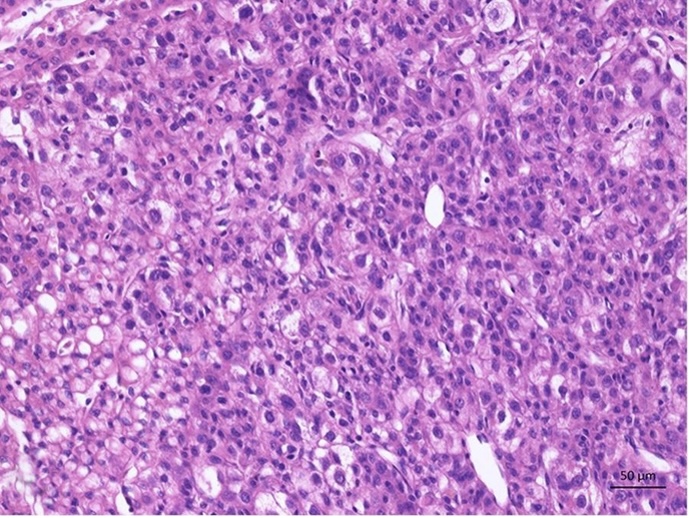Sunday Poster Session
Category: Liver
P1720 - De Novo Hepatocellular Carcinoma in a Heart Transplant Recipient: Rethinking the Oncogenic Risks of Tacrolimus
Sunday, October 26, 2025
3:30 PM - 7:00 PM PDT
Location: Exhibit Hall

Eunice Omeludike, MD (she/her/hers)
Piedmont Athens Regional Medical Centre
Athens, GA
Presenting Author(s)
Eunice Omeludike, MD1, Abdul-Rahaman A. Ottun, MD2, Eunice Aregbesola, MD3, Cherechi Nwabueze, MBBS, MPH4, Ooreoluwa Fasola, MD5, Sarpong Boateng, MD, MPH6, Chisom Nwaneki, MD, MPH7, Samuel Acheampong, MD, MSc8, Elizabeth Soladoye, MD, MPH8, Papa K. Beeko, MBChB8, Chinenye Egwuonwu, MD, MPH8, George Annan, MD1
1Piedmont Athens Regional Medical Centre, Athens, GA; 2Piedmont Athens regional medical Centre, Athens, GA; 3University of Missouri Health Care, Columbia, MO; 4John H. Stroger, Jr. Hospital of Cook County, Chicago, IL; 5Texas Tech University Health Sciences Center - Permian Basin, Odessa, TX; 6Yale New Haven Health, Bridgeport, CT; 7Saint Peter's University Hospital, New Brunswick, NJ, New Brunswick, NJ; 8Piedmont Athens Regional, Athens, GA
Introduction: Hepatocellular carcinoma (HCC) typically develops in the setting of cirrhosis, viral hepatitis, or chronic liver injury. Its appearance in solid organ transplant recipients without hepatic risk factors is rare. Tacrolimus, a calcineurin inhibitor essential for graft survival, has been linked to malignancy. This case describes incidentally discovered HCC in a heart transplant recipient on tacrolimus monotherapy, raising questions about long-term oncogenic risk
Case Description/
Methods: A 75-year-old male with a history of orthotopic heart transplantation six years prior presented with new-onset hematochezia. He denied abdominal pain, weight loss, fatigue, or changes in appetite. He had no known history of liver disease, alcohol use, or risk factors for viral hepatitis. His only post-transplant immunosuppressive therapy was low-dose tacrolimus, with consistently stable trough levels between 4–5 ng/mL. On presentation, he was hemodynamically stable. Laboratory findings were notable for hemoglobin of 11.5 g/dL; liver enzymes and function tests were within normal limits. A contrast-enhanced CT scan of the abdomen, performed to investigate the gastrointestinal bleeding, incidentally revealed a 12.1 x 9 cm hepatic mass with satellite lesions. A percutaneous biopsy confirmed moderately differentiated HCC. Serologies for hepatitis B and C were negative, and autoimmune workup was unremarkable. The patient underwent interventional embolization to address the GI bleeding and was referred for loco-regional therapy. He remains under multidisciplinary follow-up with oncology and transplant hepatology teams.
Discussion: This case highlights an unusual instance of HCC arising in the absence of usual risk factors. Although direct causation cannot be established, long-term risks tacrolimus exposure may contribute to hepatocarcinogenesis through suppression of immune surveillance and promotion of oncogenic pathways, including TGF-β signaling. The latency between transplant and tumor detection, combined with the absence of underlying liver disease, raises concern about occult oncogenic risks associated with calcineurin inhibitors. As transplant survival improves, cases like this warrant discussion around hepatic screening protocols and a potential shift toward alternative immunosuppressive regimens with anti-tumor properties, such as mTOR inhibitors. It further highlights the need for increased awareness and further study into cancer surveillance strategies for non-hepatic solid organ transplant recipients.

Figure: Histology
Disclosures:
Eunice Omeludike indicated no relevant financial relationships.
Abdul-Rahaman Ottun indicated no relevant financial relationships.
Eunice Aregbesola indicated no relevant financial relationships.
Cherechi Nwabueze indicated no relevant financial relationships.
Ooreoluwa Fasola indicated no relevant financial relationships.
Sarpong Boateng indicated no relevant financial relationships.
Chisom Nwaneki indicated no relevant financial relationships.
Samuel Acheampong indicated no relevant financial relationships.
Elizabeth Soladoye indicated no relevant financial relationships.
Papa Beeko indicated no relevant financial relationships.
Chinenye Egwuonwu indicated no relevant financial relationships.
George Annan indicated no relevant financial relationships.
Eunice Omeludike, MD1, Abdul-Rahaman A. Ottun, MD2, Eunice Aregbesola, MD3, Cherechi Nwabueze, MBBS, MPH4, Ooreoluwa Fasola, MD5, Sarpong Boateng, MD, MPH6, Chisom Nwaneki, MD, MPH7, Samuel Acheampong, MD, MSc8, Elizabeth Soladoye, MD, MPH8, Papa K. Beeko, MBChB8, Chinenye Egwuonwu, MD, MPH8, George Annan, MD1. P1720 - <i>De Novo</i> Hepatocellular Carcinoma in a Heart Transplant Recipient: Rethinking the Oncogenic Risks of Tacrolimus, ACG 2025 Annual Scientific Meeting Abstracts. Phoenix, AZ: American College of Gastroenterology.
1Piedmont Athens Regional Medical Centre, Athens, GA; 2Piedmont Athens regional medical Centre, Athens, GA; 3University of Missouri Health Care, Columbia, MO; 4John H. Stroger, Jr. Hospital of Cook County, Chicago, IL; 5Texas Tech University Health Sciences Center - Permian Basin, Odessa, TX; 6Yale New Haven Health, Bridgeport, CT; 7Saint Peter's University Hospital, New Brunswick, NJ, New Brunswick, NJ; 8Piedmont Athens Regional, Athens, GA
Introduction: Hepatocellular carcinoma (HCC) typically develops in the setting of cirrhosis, viral hepatitis, or chronic liver injury. Its appearance in solid organ transplant recipients without hepatic risk factors is rare. Tacrolimus, a calcineurin inhibitor essential for graft survival, has been linked to malignancy. This case describes incidentally discovered HCC in a heart transplant recipient on tacrolimus monotherapy, raising questions about long-term oncogenic risk
Case Description/
Methods: A 75-year-old male with a history of orthotopic heart transplantation six years prior presented with new-onset hematochezia. He denied abdominal pain, weight loss, fatigue, or changes in appetite. He had no known history of liver disease, alcohol use, or risk factors for viral hepatitis. His only post-transplant immunosuppressive therapy was low-dose tacrolimus, with consistently stable trough levels between 4–5 ng/mL. On presentation, he was hemodynamically stable. Laboratory findings were notable for hemoglobin of 11.5 g/dL; liver enzymes and function tests were within normal limits. A contrast-enhanced CT scan of the abdomen, performed to investigate the gastrointestinal bleeding, incidentally revealed a 12.1 x 9 cm hepatic mass with satellite lesions. A percutaneous biopsy confirmed moderately differentiated HCC. Serologies for hepatitis B and C were negative, and autoimmune workup was unremarkable. The patient underwent interventional embolization to address the GI bleeding and was referred for loco-regional therapy. He remains under multidisciplinary follow-up with oncology and transplant hepatology teams.
Discussion: This case highlights an unusual instance of HCC arising in the absence of usual risk factors. Although direct causation cannot be established, long-term risks tacrolimus exposure may contribute to hepatocarcinogenesis through suppression of immune surveillance and promotion of oncogenic pathways, including TGF-β signaling. The latency between transplant and tumor detection, combined with the absence of underlying liver disease, raises concern about occult oncogenic risks associated with calcineurin inhibitors. As transplant survival improves, cases like this warrant discussion around hepatic screening protocols and a potential shift toward alternative immunosuppressive regimens with anti-tumor properties, such as mTOR inhibitors. It further highlights the need for increased awareness and further study into cancer surveillance strategies for non-hepatic solid organ transplant recipients.

Figure: Histology
Disclosures:
Eunice Omeludike indicated no relevant financial relationships.
Abdul-Rahaman Ottun indicated no relevant financial relationships.
Eunice Aregbesola indicated no relevant financial relationships.
Cherechi Nwabueze indicated no relevant financial relationships.
Ooreoluwa Fasola indicated no relevant financial relationships.
Sarpong Boateng indicated no relevant financial relationships.
Chisom Nwaneki indicated no relevant financial relationships.
Samuel Acheampong indicated no relevant financial relationships.
Elizabeth Soladoye indicated no relevant financial relationships.
Papa Beeko indicated no relevant financial relationships.
Chinenye Egwuonwu indicated no relevant financial relationships.
George Annan indicated no relevant financial relationships.
Eunice Omeludike, MD1, Abdul-Rahaman A. Ottun, MD2, Eunice Aregbesola, MD3, Cherechi Nwabueze, MBBS, MPH4, Ooreoluwa Fasola, MD5, Sarpong Boateng, MD, MPH6, Chisom Nwaneki, MD, MPH7, Samuel Acheampong, MD, MSc8, Elizabeth Soladoye, MD, MPH8, Papa K. Beeko, MBChB8, Chinenye Egwuonwu, MD, MPH8, George Annan, MD1. P1720 - <i>De Novo</i> Hepatocellular Carcinoma in a Heart Transplant Recipient: Rethinking the Oncogenic Risks of Tacrolimus, ACG 2025 Annual Scientific Meeting Abstracts. Phoenix, AZ: American College of Gastroenterology.
